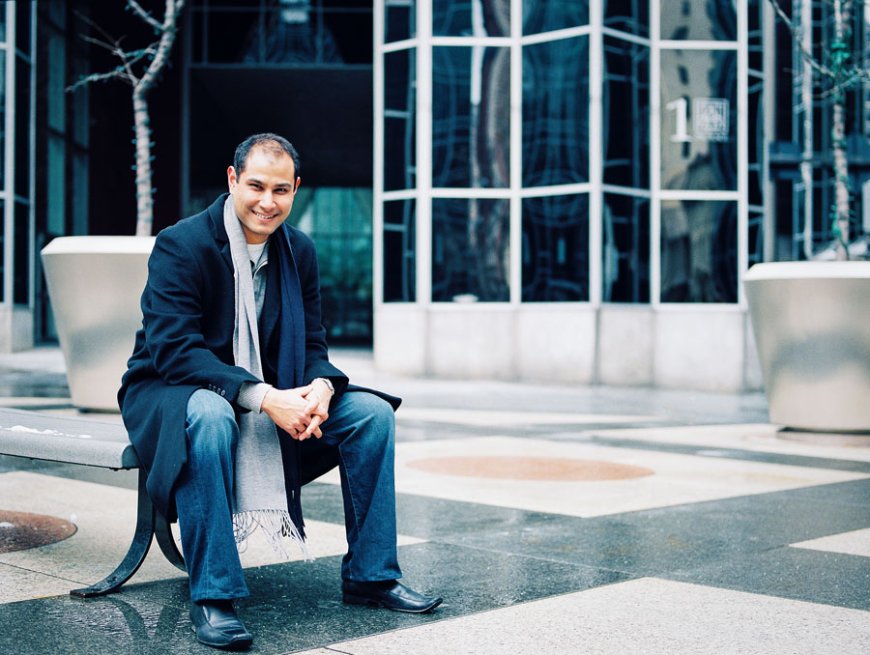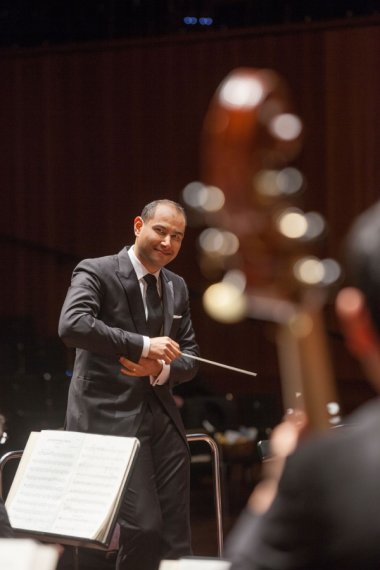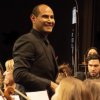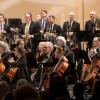
Conductor Fawzi Haimor is elated. After several decades of moving around, working with orchestras throughout the United States and worldwide, he explained that his new position as music director of Marin Symphony will be the first time he has had the opportunity to collaborate with musicians from the area where he grew up.
Born in Chicago to a Jordanian father and Filipino mother, Haimor and his family moved to Saudi Arabia just after he was born when his father got a post there with the U.N. Haimor went to an international school and took up the violin at an early age, beginning what he calls his “obsession” with music.
The family moved to the Bay Area when Haimor was around 11, and he began playing in a string orchestra in high school. He soon fell in love with Beethoven, who he says changed his life, and then began discovering other great composers like Gustav Mahler, Richard Strauss, and Richard Wagner. He also started to become interested in conducting.

His career has flourished over the years, leading him to the helm of numerous orchestras worldwide, including with a stint as music director of the Württembergische Philharmonie Reutlingen from 2017 to 2020.
In addition to the Western classical canon, Haimor is also an advocate of contemporary composers and music of other cultures, and has performed premieres by composers such as Kevin Puts, Béla Fleck, Mohammed Fairouz, and Avner Dorman.
Tod Brody, executive director of Marin Symphony, explained that they chose Haimor over the other three finalists for a number of reasons.
“The prospect of choosing a successor to Marin Symphony’s beloved Music Director Alasdair Neale was daunting,” Brody explained. “But in Fawzi Haimor, I think we've made an ideal choice. Like Alasdair, he is a masterful conductor and a profound musician.
“During his residency/audition week, he impressed all constituency groups with his integrity, intelligence, and communication skills. He is especially eloquent on the subject of the importance of music not just as an entertainment, but as one of life's essentials, and I'm looking forward to that recognition setting an exciting course for the orchestra.”
Haimor’s first concerts as the new music director with Marin Symphony will be Masterworks 1: Liszt & Brahms, featuring pianist John Wilson, which is slated to take place on Saturday, Nov. 8 at 3 p.m. and 7:30 p.m., and Sunday, Nov. 9 at 3 p.m. at College of Marin’s James Dunn Theatre in Kentfield.
You said that Beethoven changed your life; tell me about that.
Early on in high school, before we had the internet, I would get blank staff paper and listen to recordings of Daniel Barenboim with different orchestras. And it was always Beethoven. I was absolutely addicted to it. I would put headphones on and spend hours and hours in my room — pause, rewind, pause, rewind — and I would write down the notes I heard from the violin section so I could play along with the recording. And as I continued to play Beethoven in orchestras, at one point I realized I wanted to dedicate my life to music, so I really owe it to Beethoven.
Was there any particular experience that influenced your choice to become a conductor?
Yes, there was a specific moment that really clicked in my head. I was around 16 and in high school. I wanted to write music for an ensemble. So I wrote a piece for string orchestra and one day I showed it to my orchestra teacher and conductor and asked him to look at it and give me some advice. He came to me a week later and said, “Fawzi, I want you to conduct it at our winter concert.” I had never conducted so I just got up on the podium and rehearsed the orchestra and sure enough at that concert, it was me conducting. It was such a special moment — an incredible feeling that never left me.
You started out pursuing medicine but switched to music. Do you see a connection between the two?
My degree being in neurobiology, I’ve actually done some studies on the connection of music and the brain, and there are so many ways that they are connected. Like the fact that music itself has a healing power just like medicine does. I am genuinely obsessed with that and always try to find ways to connect the two together. We’re in a very difficult world, and if we could just somehow take the burden off the shoulders of our audience and give them a couple of hours of relief, then you know that we’re doing our job correctly.

Your first permanent position as music director of an orchestra was in Germany at the Württembergische Philharmonie Reutlingen from 2017 to 2020. What was that like?
I had a wonderful relationship with them. Performing Beethoven with a German orchestra is unlike anything else. It was an incredible experience just being able to be rooted in the country that gave us Beethoven, and with musicians who grew up where music is culture.
What appeals to you about working with Marin Symphony?
It’s a dream come true. I've spent three-quarters of my life here in the Bay Area, and the Marin Symphony is the first orchestra I have ever conducted where I will be able to collaborate with musicians in my own community and get to sleep in my own bed. I have had the great joy of working with great musicians all over the world and learning from them, but to be able to work with an orchestra and musicians that are part of my own backyard will be very special to me.
Also, I can’t wait to work with the chorus. Part of the reason I was so interested in this job was the fact that there was a chorus attached to the orchestra. It is an absolute gift and a pleasure, and I am so grateful and excited to be part of this organization.

Were you involved in picking the repertoire for the coming season?
Yes. Tod [Brody, executive director] had a few things already set in place, but in the overall season, many of the pieces were given to me once I was given the call. Then Tod and I sat in a room for five hours and just kind of talked it over.
I think the underlying theme for me, considering it was a season of new beginnings, was that I wanted to make sure that there was at least one piece on every single program that has never been played in the orchestra’s history.
Which piece is that on the upcoming program?
A new piece by John Psathas, a New Zealand Greek composer. He is a dear friend of mine and a great composer.
Do you think in future seasons you might program some music connected to your unique mixed Middle Eastern and Filipino background?
Yes, definitely from my Middle Eastern-Filipino heritage culture. There’s great music out there that’s foreign to the western world. One thing that was immediately apparent to me in my first week in Marin [April 12–13, 2025], was, when we played Kareem Roustom’s piece, how open the audience was to that opener. I got a lot of good feedback from audience members, and that’s when I knew that this audience was ready to hear a lot of new great things out there.




